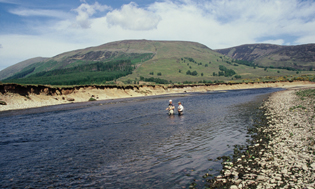 The Lochaber District Salmon Fishery Board (LDSFB) is condemning the actions of one local salmon netsman who has unilaterally terminated a conservation agreement in order to kill scarce spring salmon.
The Lochaber District Salmon Fishery Board (LDSFB) is condemning the actions of one local salmon netsman who has unilaterally terminated a conservation agreement in order to kill scarce spring salmon.
In 2009 a historic conservation agreement, brokered by LDSFB, was signed by all the major salmon proprietors in Lochaber – both rod and net fishing interests – to prevent the killing of any fish before June 1st by nets and before June 15th by rods for the next six years.
This agreement has now been broken by tenant netsman Sandy MacLachlan, the operator of the main net fishery in the District at Cuil Bay in Loch Linnhe, who began operations last week. This action by Mr MacLachlan has been sanctioned by the netting station’s owner Kim Malcolm.
Jon Gibb, Clerk to the LDSFB, commented: “The principle behind the ground-breaking 2009 agreement was that, if numbers of the important early-running salmon of Lochaber were to recover, then everyone had to make sacrifices, understanding that, without a recovery of spring salmon stocks, any further exploitation was both unwise and almost certainly unsustainable. Proprietors and angling club committees across Lochaber agreed to it as they understood that conservation was the absolute priority.”
Mr Gibb continued: “This whole agreement has now been thrown into jeopardy by the actions of those who appear not to appreciate that all fisheries have a common interest in protecting spring salmon stocks. We are informed that Mr MacLachlan is suffering ‘financial hardship’ because of not being able to net salmon until June. However, this claim is difficult to understand as he has only ever reported to the Scottish Government catching a handful of fish before June each year over the last two decades. During the main part of the season this one net fishery already kills more salmon every year than all the other rivers in the Loch Linnhe region put together, which makes this increase in exploitation all the more galling.”
Dr Alan Wells, Policy and Planning Director for the Association of Salmon Fishery Boards, commented: “The Association are extremely concerned by this recent development. The 2009 conservation agreement was a very welcome initiative which required all fisheries in the district to work together to protect fragile stocks of spring salmon. Scotland’s rod fisheries have taken conservation to heart in recent years. According to the preliminary official statistics for 2011, anglers released back into the water 73 % of all salmon caught and 91 % of the spring stock component. It sends out all the wrong signals, both nationally and internationally, if there are expansions in netting activity and the commercial exploitation of salmon stocks in Scotland – particularly very scarce west Highland spring salmon.”
Dr Wells added: “There are limitations to what Fishery Boards or other conservation organisations can do to prevent an increase in netting activity. In the absence of voluntary agreements the only course of action open to the LDSFB is an application to Scottish Minsters for conservation measures in order to protect these important spring fish. The Association will give full support to any such application from the LDSFB.”
